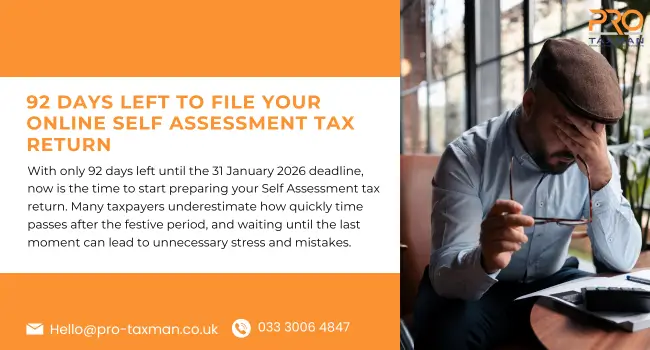With only 92 days left until the 31 January 2026 deadline, now is the time to start preparing your Online Self Assessment tax return. Many taxpayers underestimate how quickly time passes after the festive period, and waiting until the last moment can lead to unnecessary stress and mistakes.
This guide explains why filing early matters, who needs to file, and how to make the process as smooth as possible.
Why You Should File Early
Every year, thousands of taxpayers leave their Self Assessment until the final week of January. HMRC systems slow down under heavy demand, documents go missing, and last-minute errors become costly. Filing early avoids these issues and gives you:
- Peace of mind – You won’t have to worry about missing the deadline.
- Better cash flow management – You’ll know how much tax you owe in advance.
- Fewer mistakes – You can take time to check figures and claim allowances correctly.
- Faster refunds – If you’ve overpaid tax, you’ll receive your money sooner.
Filing early also allows you to plan ahead, rather than rushing in January when HMRC helplines are busiest.
Who Needs to File a Online Self Assessment Tax Return?
You must complete a Self Assessment if you:
- Are self-employed and earned more than £1,000.
- Are a partner in a business partnership.
- Receive rental income from property.
- Earn dividends or other investment income.
- Have foreign income or capital gains.
- Are a company director (unless your income is fully taxed under PAYE).
If you are unsure whether you need to file, HMRC provides an online tool to help you check your status.
Information You Need to File
Before you begin, gather all the documents and details required to complete your return accurately:
- Unique Taxpayer Reference (UTR) and Government Gateway login.
- Records of income and expenses if you are self-employed.
- P60 or P45 forms if you are employed.
- Details of any benefits, savings interest, or dividends.
- Proof of pension contributions or charitable donations for relief claims.
Keeping your records organised throughout the year can make this process significantly easier.
Claiming Allowances and Reliefs
Submitting your tax return early gives you more time to ensure you make full use of available allowances and reliefs. These might include:
- The Annual Investment Allowance (AIA) for equipment and business assets.
- The Marriage Allowance, if you transfer part of your personal allowance to your spouse or civil partner.
- Pension contributions, which can reduce your taxable income.
- Gift Aid donations to charities, which can also provide tax relief.
Taking time to review your tax position with a qualified accountant can help you identify these savings opportunities before you file.
Penalties for Missing the Deadline
Missing the 31 January deadline comes with automatic penalties. The initial £100 fine applies even if you owe no tax, and further penalties increase the longer your return remains unfiled. Interest and surcharges may also apply to any unpaid tax.
By starting early, you eliminate the risk of penalties and reduce the pressure that comes with last-minute filing.
Frequently Asked Questions (FAQ)
1. How much do accountants charge for self-assessment in the UK?
The cost varies depending on the complexity of your tax situation. For a straightforward tax return, most accountants charge between £150 and £300. More complex returns involving property income, foreign income, or capital gains can cost £400 or more. It’s worth getting a few quotes before you decide.
2. Can I claim accountant fees on a online self-assessment tax return?
Yes, if you are self-employed, you can usually claim your accountant’s fees as an allowable business expense. This means you can deduct them from your taxable profits. However, if you are an employee or landlord, these costs are generally not tax-deductible.
3. Is it worth getting an accountant for self-assessment?
In most cases, yes. A qualified accountant can help ensure your return is accurate, that you claim all eligible reliefs, and that you avoid penalties. They can also save you time and potentially reduce your overall tax liability which often offsets the cost of their services.
Conclusion
With only 92 days remaining, now is the best time to begin your Self Assessment Tax Return process. Filing early saves you time, reduces stress, and gives you a clearer picture of your financial position.
If you’re unsure where to start or want professional guidance, Pro Taxman can help you prepare, review, and file your tax return accurately and on time.

